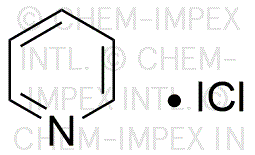Pyridine iodine monochloride is widely utilized in research focused on:
- Synthesis of Organic Compounds: It serves as an effective reagent in the synthesis of various organic compounds, particularly in the introduction of iodine into aromatic systems, which is crucial for developing pharmaceuticals and agrochemicals.
- Oxidation Reactions: This compound is valuable in oxidation reactions, allowing chemists to convert alcohols to carbonyl compounds efficiently, thereby streamlining synthetic pathways in organic chemistry.
- Halogenation Processes: It is employed in halogenation processes, where it facilitates the introduction of chlorine and iodine into organic molecules, enhancing the reactivity and functionality of the resulting compounds.
- Research in Medicinal Chemistry: Pyridine iodine monochloride is used in medicinal chemistry to modify drug candidates, improving their efficacy and selectivity, which is essential for developing new therapeutic agents.
- Analytical Chemistry: This chemical is also utilized in analytical methods to detect and quantify specific compounds, providing researchers with reliable data for various applications in quality control and environmental monitoring.
General Information
Properties
Safety and Regulations
Applications
Pyridine iodine monochloride is widely utilized in research focused on:
- Synthesis of Organic Compounds: It serves as an effective reagent in the synthesis of various organic compounds, particularly in the introduction of iodine into aromatic systems, which is crucial for developing pharmaceuticals and agrochemicals.
- Oxidation Reactions: This compound is valuable in oxidation reactions, allowing chemists to convert alcohols to carbonyl compounds efficiently, thereby streamlining synthetic pathways in organic chemistry.
- Halogenation Processes: It is employed in halogenation processes, where it facilitates the introduction of chlorine and iodine into organic molecules, enhancing the reactivity and functionality of the resulting compounds.
- Research in Medicinal Chemistry: Pyridine iodine monochloride is used in medicinal chemistry to modify drug candidates, improving their efficacy and selectivity, which is essential for developing new therapeutic agents.
- Analytical Chemistry: This chemical is also utilized in analytical methods to detect and quantify specific compounds, providing researchers with reliable data for various applications in quality control and environmental monitoring.
Documents
Safety Data Sheets (SDS)
The SDS provides comprehensive safety information on handling, storage, and disposal of the product.
Product Specification (PS)
The PS provides a comprehensive breakdown of the product’s properties, including chemical composition, physical state, purity, and storage requirements. It also details acceptable quality ranges and the product's intended applications.
Certificates of Analysis (COA)
Search for Certificates of Analysis (COA) by entering the products Lot Number. Lot and Batch Numbers can be found on a product’s label following the words ‘Lot’ or ‘Batch’.
*Catalog Number
*Lot Number
Certificates Of Origin (COO)
This COO confirms the country where the product was manufactured, and also details the materials and components used in it and whether it is derived from natural, synthetic, or other specific sources. This certificate may be required for customs, trade, and regulatory compliance.
*Catalog Number
*Lot Number
Safety Data Sheets (SDS)
The SDS provides comprehensive safety information on handling, storage, and disposal of the product.
DownloadProduct Specification (PS)
The PS provides a comprehensive breakdown of the product’s properties, including chemical composition, physical state, purity, and storage requirements. It also details acceptable quality ranges and the product's intended applications.
DownloadCertificates of Analysis (COA)
Search for Certificates of Analysis (COA) by entering the products Lot Number. Lot and Batch Numbers can be found on a product’s label following the words ‘Lot’ or ‘Batch’.
*Catalog Number
*Lot Number
Certificates Of Origin (COO)
This COO confirms the country where the product was manufactured, and also details the materials and components used in it and whether it is derived from natural, synthetic, or other specific sources. This certificate may be required for customs, trade, and regulatory compliance.


